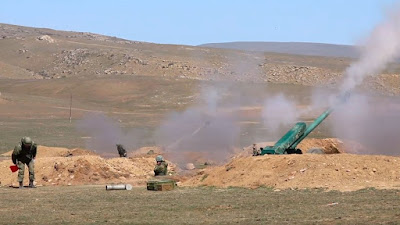Russian Naval Infantry - January 2021
January 01
Caspian Flotilla:
The Russian Ministry of Defense announced that the servicemen attached to the air assault battalion and reconnaissance units have completed their parachute training program during 2020. Each marine conducted at least 20 parachute jumps as part of their training program. In total, over 2.000 parachute jumps took place during 2020. The parachute jumps take place in full combat gear from Mi-8 transport helicopters. The heights are between 800 and 1.500 meters.
In 2021, the Caspian Flotilla Naval Infantry will receive the modernized D-10 which allows for a total weight of 140 kilograms. This allows for heavier weapons or more ammunition to be carried by the air assault and reconnaissance units. [1]
January 05
Caspian Flotilla:
The Russian Military of Defense announced that 1.000 pieces of modern small arms have entered service in the Naval Infantry units of the Caspian Flotilla. The majority of these small arms are reported as AK-12 assault rifles and AGS-17 grenade launchers. [2]
January 08
Caspian Flotilla:
Artillery officers are involved in a professional competition at the Adanak training range in Dagestan which will last for five days. The officers, who serve as commanders of artillery platoons, batteries and divisions, will compete in meeting the technical, special, tactical, engineering standards. Exercises during this competition involve deploying and transporting the artillery system, preparing the firing position and camouflage. The artillery system used in this competition is allegedly the D-30 122mm towed artillery system. The artillery officers will be assessed on their capabilities during this competition. the best ranking officers will be selected for similar competition held at the level of the Southern Military District. [3]
Caspian Flotilla:
Around 300 servicemen, 50 BTR-82A APCs and at least two Serna class landing craft, took part in amphibious training exercises at the 'Scorpion' training range in Dagestan. The exercise involved the driver-mechanics loading on and unloading from Serna landing crafts as well as operating their vehicles on the water.
A video of the exercise was shared by TVZvezda and showed the marines also practicing coastal defense during this training, which involved engaging an opponent with small arms fire. At least two Serna class landing craft, identified with hull numbers 722 and 723, were shown in the video. [4]
January 13
Pacific Fleet:
Reconnaissance units are deployed to the Bamburovo training ground in the Primorsky Territory for tactical exercises. One of the exercises involves fighting off hostile reconnaissance and sabotage groups in the littoral zone. Aside from tactical and physical training, and driving combat vehicles, the troops will also study the weapons and tactics used by special forces. [5]
January 15
Caspian Flotilla:
Around 300 marines held several firing exercises at the Adanak training ground in Dagestan which involved the use of BTR-82A APCs and several heavy weapons on the platoon level. Marines first underwent theoretical training before moving on to the firing exercises. This training involved studying the safety requirements, the purpose and design of weapons involved as well as the sighting devices and ammunition. Signals and commands given on the firing ranges were also trained.
Once on the training ground the firing exercise involved two different set ups. The first involved firing the main weapons of the BTR-82A armored personnel carrier. These weapons are the 30mm 2A72 canon and coaxial 7.62mm PKTM machine gun.
The infantry, normally mounted inside the BTR-82A, held their own firing exercises which involved the AGS-17 heavy grenade launcher, the RPG-7 hand-held anti-tank grenade launcher, and the Kord heavy machine gun. [6] [7]
Once on the training ground the firing exercise involved two different set ups. The first involved firing the main weapons of the BTR-82A armored personnel carrier. These weapons are the 30mm 2A72 canon and coaxial 7.62mm PKTM machine gun.
The infantry, normally mounted inside the BTR-82A, held their own firing exercises which involved the AGS-17 heavy grenade launcher, the RPG-7 hand-held anti-tank grenade launcher, and the Kord heavy machine gun. [6] [7]
January 18
Caspian Flotilla:
A battalion tactical group held a combat exercise at the Adanak training ground in the Dagestan Region. The BTG was tasked to break through the lines held by a conventional enemy and set up firing positions. Once in position, the BTG had to work out several actions in order to defend their recently occupied positions. Fire support was provided by ten D-30 howitzers. Several unmanned aerial vehicles were used to provide reconnaissance, target information and correction.
The focus of the exercise was on the tactical maneuvering of the BTG and its subunits and took in account combat experience gained in recent years.
The focus of the exercise was on the tactical maneuvering of the BTG and its subunits and took in account combat experience gained in recent years.
In total, over 600 marines took part in this exercise, supported by over 100 pieces of military equipment which included BTR-82A armored personnel carriers and Ural-4320 trucks. [8]
January 28
Baltic Fleet:
Servicemen attached to the air assault battalion and the reconnaissance units will be conducting over 3.000 parachute jumps as part of a training course. Jumps will be conducted from Mi-8 helicopters and An-26 aircraft. The marines will use the D-10 and Arbalet parachute systems during this training. [9]
January 29
Caspian Flotilla:
Over 1.000 servicemen, supported by 200 pieces of military equipment, are involved in a week long training exercise at the Adanak training round in Dagestan. The exercises are held on squad, platoon and company levels with the focus being reportedly firing at simulated target positions with small arms, anti-tank systems, armored personnel carriers and artillery systems.
BTR-82A crews train in handling their vehicles, perform reconnaissance and engage targets both from a stationary and mobile position.
Grenade launcher teams and sniper pair are also involved in the exercise. Both groups reportedly work in conjunction to engage and destroy several targets. [10]


